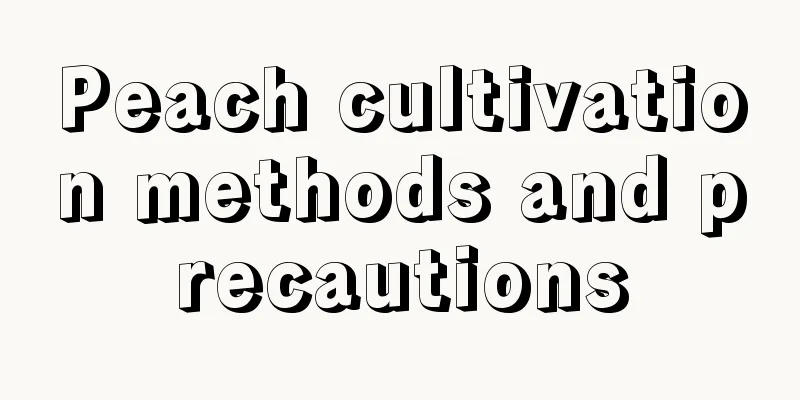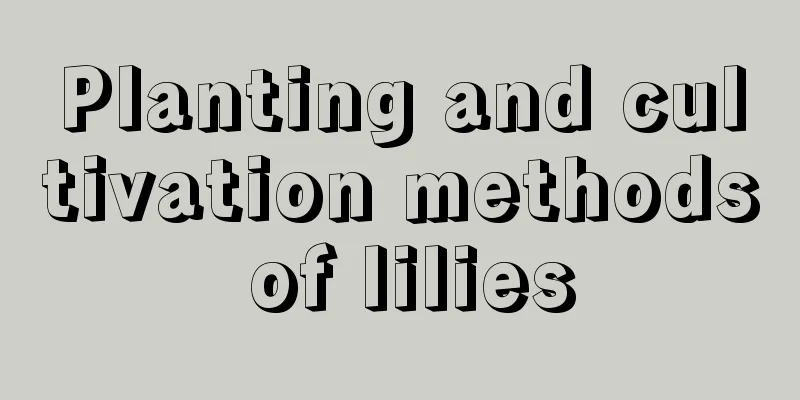Peach cultivation methods and precautions

1. Maintenance methods1. Soil: The soils generally chosen for planting are sandy loam and gravel soil. Acidic soil is very helpful for its root growth and can promote its root system to develop and strengthen. 2. Water: It has a great demand for water and needs to be watered sufficiently. Water it when the soil is dry. Sufficient water can make its branches and leaves lush and strong, but excessive watering is not good. 3. Nutrients: Organic fertilizer and fruit fertilizer are generally used as topdressing. Select an appropriate amount of fertilizer and spread it evenly in the soil. Adequate nutrients can make the plants grow strong and the fruits thick, large and sweet. 4. Light: Peach is a plant that likes plenty of sunlight. Sufficient and bright light can make it grow well. However, it should not be exposed to strong light all the time, as this will affect the moisture conservation of its branches and leaves. 2. Breeding techniques1. Pruning: Pruning should be divided into juvenile pruning and adult pruning. When the tree is young, the focus should be on nurturing branches and removing tips, which can better help its branches and leaves grow strong. When the plant is mature, it should be pruned in a way that allows ventilation, mainly pruning dense branches, diseased branches, old branches and dead branches. 2. Reproduction: Grafting is generally used for reproduction. Select strong young shoots and graft them onto seedlings. In about 10-15 days, you will see the grafted branches take root and can be transplanted in the spring of next year. 3. Problem diagnosis and treatment1. Leaf curl: A common disease in peach cultivation is leaf curl, which usually occurs during the germination period in early spring. At this time, lime sulfur can be diluted with water and sprayed to solve the problem. 2. Peach borer: The most common insect pest is the peach borer, which has a great impact on the erosion of peaches. Protection should be started at an early stage by diluting cypermethrin with water and spraying it. IV. Other issues1. How to spend the winter: Peach trees will hibernate in winter, and they should be watered once at this time. Then prune off dead branches, diseased branches, and deformed trunks, which will help the branches to be stronger when they sprout in early spring next year. 2. Is it edible? Peaches are edible. The flesh is thin and the skin is thin. Hard peaches are crisp, sweet and delicious, while soft peaches are sticky, fragrant and juicy. They are a very common fruit. |
<<: Tree strangler cultivation methods and precautions
>>: Cultivation methods and precautions of hydroponic Brazilian wood
Recommend
Do I need to repot the original soil and pot when it is delivered (will the seedlings still need to be repotted after the original soil is purchased)
Should I repot the potted plants immediately afte...
Causes and treatments of yellow leaves of dragon blood tree
1. Insufficient light 1. Reason: If the dragon bl...
Why are the leaves of transplanted gardenias wilting?
1. The flower soil is not suitable 1. Reason: Gar...
How to keep the pennywort neat and how to keep it in winter?
1. Keep it neat 1. Control light: Although suffic...
Precautions and pruning methods for red snowflake cultivation
Many people like to grow blue snow flowers . In f...
How to prune grapevines (when and how to prune)
When to prune grapevines The best time to prune g...
Can I grow cherries at home?
Can I grow cherries at home? You can grow cherrie...
Garlic cultivation methods and precautions
1. Breeding methods 1. Temperature: 18 to 26 degr...
How to grow Pilea coleus in winter, what to do if the edges of the leaves turn black
1. How to grow cold water flowers in winter 1. In...
What should I do if the leaves of Christmas cactus become soft and wilted?
Root rot Is the area where the roots meet the soi...
Introduction to multi-headed chrysanthemum varieties and pictures of multi-headed chrysanthemum
1. Introduction Multi-headed chrysanthemum, also ...
How to prune heartleaf vine
1. Pruning method After entering spring, you can ...
Rare and high-end vegetable varieties, the latest special vegetable varieties ranking and pictures
Generally speaking, the most expensive vegetable ...
How to propagate daffodils
1. Side ball breeding The method of side bulb pro...
How to distinguish between basil and nepeta
1. Observe the leaves Comparing the two, the leav...









